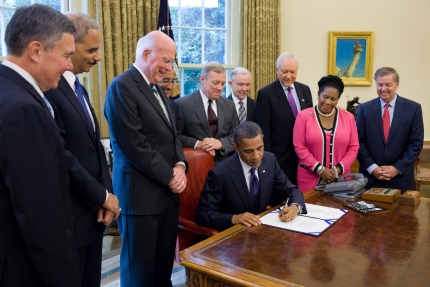Blog Posts Related to the African American Community
Wall Street Reform & the African American Community
Posted by on August 4, 2010 at 9:33 AM EST[UPDATE: This event has now concluded, watch the full video below.]
For those who have watched our animated video explainer on Wall Street Reform, there’s probably no question that there are benefits in there for every American as a taxpayer, a citizen, and a consumer.
That's true when it comes to the new Consumer Financial Protection Bureau passed as part of the bill as well, but there are communities for which that will have a particularly big impact. Throughout the debate in Congress, for example, we discussed how military families and our troops were often targets for shady lending practices and would get new protections under reform.
Today we’re going to take 45 minutes to focus on how Wall Street Reform will affect the African American community, which has long seen more than its share of the kinds of practices the Consumer Financial Protection Bureau will put to an end.
Ceci Rouse, who sits on the Council of Economic Advisors, will take questions from representatives Black Enterprise, theGrio, and Jack & Jill Politics – all of whom have been collecting questions from their readers – at 1:00 EDT this afternoon. And, as usual, we’ll be tossing a few live questions into the mix.
Learn more about Civil RightsPresident Obama to Young African Leaders: "50 Years From Now, When You Look Back..."
Posted by on August 3, 2010 at 5:41 PM ESTThis afternoon the President held a town hall with 115 young leaders from more than 40 countries across Africa -- it was the kind of White House event under this President that surprises you, catching you off guard with its honesty.
For those interested in Africa and its development, or for that matter this President's engagement with not just heads of state, but with people all over the world, the video is well worth watching (for info on America's diplomatic progress see our fact sheet as well). Here's the transcript of the final Q&A:
Learn more about Foreign PolicyPresident Obama Signs the Fair Sentencing Act
Posted by on August 3, 2010 at 3:58 PM ESTThis morning the President signed the Fair Sentencing Act, which reduces the disparity in the amounts of powder cocaine and crack cocaine required for the imposition of mandatory minimum sentences and eliminates the mandatory minimum sentence for simple possession of crack cocaine. It also increases monetary penalties for major drug traffickers.
Press Secretary Robert Gibbs was asked about the legislation in his daily press briefing and responded:
MR. GIBBS: Well, let me see if there’s any guidance on it. I will say this, April, I think the signing of today’s bill into law represents the hard work of Democrats and Republicans coming -- this is a good example -- of coming together and making progress on something that people had identified as a glaring blight on the law.
Look, I think if you look at the people that were there at that signing, they’re not of the political persuasions that either always or even part of the time agree. I think that demonstrates the, as I said, the glaring nature of what these penalties had -- the glaring nature of what these penalties had done to people and how unfair they were. And I think the President was proud to sign that into law.
Learn more about Civil RightsPrevention is a Priority -- Now It's a Reality
Posted by on July 14, 2010 at 9:01 PM ESTEarlier today, I joined First Lady Michelle Obama and Dr. Jill Biden to discuss how the Affordable Care Act will give millions of Americans access to preventive care through their private health insurance.
Today, too many Americans today aren't getting the preventive health care they need. Right now, for example, 59 million adults and 11 million children depend on private health insurance that doesn't adequately cover immunizations. And 12 percent of children haven't visited a doctor in the last year.
The statistics are even more troubling in our minority communities. African-American mothers are 2.5 times as likely as white mothers to begin prenatal care in the 3rd trimester, or not receive it at all. And only 37 percent of Latinos were screened for colon cancer in 2007, compared to 57 percent of whites.
Our challenge is to remove the obstacles between patients getting the preventive services that they need to stay healthy. If we fail in this challenge, we all pay the price. If we succeed -- we are on our way to a healthier nation. According to one study, if people got just five types of preventive services when they needed to -- colorectal and breast cancer screening, flu vaccines, counseling to help them quit smoking, and regular aspirin use to prevent strokes -- we could avert 100,000 deaths each year. Use of preventive services can also help bring costs down in a variety of ways. For example, people who are obese have health care costs that are 39 percent above average, and reducing obesity and the diseases related to it could lower premiums overall by 0.05 to 0.1 percent.
Those are just a few of the reasons why President Obama has made improving access to preventive care a priority from his first day in office and why we released new rules requiring all new private health insurance plans with plan years beginning on or after September 23, 2010 to cover recommended preventive services without cost-sharing when delivered by a network provider. The new rules mean that services like blood pressure, diabetes and cholesterol tests, cancer screenings, routine vaccinations, and well-baby visits will be provided without a deductible, co-pay or co-insurance.
We know that eliminating these costs for regular preventive services can ensure more Americans will use these services. And we know these services can save lives.
At the announcement yesterday, we met Maggie Roberts from California. When Maggie's son was just a toddler, he was diagnosed with cancer during a routine checkup. Because they caught it early, the cancer was successfully treated, and years later he is still cancer-free. It's a powerful story of how important preventive care can be.
You can learn more about the new preventive benefits available under the law, and get more tips on how to stay healthy by visiting our new website, www.HealthCare.gov.
Kathleen Sebelius is Secretary of Health and Human Services
Learn more about Health CareBreakfast in Harlem
Posted by on June 10, 2010 at 1:03 PM ESTEarlier this month, I had the honor of participating in the Harlem Renaissance Day of Commitment Leadership Breakfast. Before coming to government, I had worked with the former pastor of Abyssinian Baptist Church, Dr. Samuel Proctor. This event was my first opportunity to meet Dr. Calvin Butts, III, the current pastor at Abyssinian Baptist Church and the founder and chair of Abyssinian Development Corporation (ADC).
The event honored Marian Wright Edelman, founder of the Children’s Defense Fund, and Thomas J. McInerney, chief operating officer of the ING Foundation. I agree with Marian Wright Edelman’s sentiment that the participation of faith communities like Abyssinian Baptist Church can help end the educational gap among America’s children.The work of ADC and the church is phenomenal and the results illustrate what can happen when a church becomes actively involved in education. Last year, the Abyssinian Head Start graduated a class with 100% of the students Kindergarten-ready. The Thurgood Marshall Academy Lower School had similar stellar results with the 4th grade class ranked #1 among District 5 elementary schools on state English and math exams. The Thurgood Marshall Academy for Learning and Social Change has an 83% four-year graduation rate and 81% of graduating seniors were accepted into colleges.
Forty years ago when I lived in Harlem, the community was facing some extraordinary challenges. Today, it is really exciting to see the progress that ADC is making in community development and education. Their community exemplifies that how much can be accomplished through these partnerships.
Ken Bedell is Senior Advisor at the Center for Faith-based and Neighborhood Partnerships at the Department of Education.

Rev. Dr. Calvin O. Butts, III, Chairman of Abyssinian Development Corporation; Georgi Exinord, 8th Grade Student at the Thurgood Marshall Academy for Learning and Social Change; Mrs. Marian Wright Edelman, Founder & President, Children’s Defense Fund; and Sheena Wright, President & CEO, Abyssinian Development Corporation. June 2, 2010.
White House Meeting on Black Men and HIV
Posted by on June 4, 2010 at 2:50 PM ESTThe toll of the HIV epidemic among Black men in the United States is staggering. CDC estimates that 1 in 16 Black men will become infected with HIV in their lifetime. An estimated two-thirds of people living with HIV/AIDS in the Black community are men, and Black men in some U.S. cities have HIV rates as high as heavily impacted countries in Africa. According to CDC, Black gay and bisexual men are the most heavily impacted population in the Black community. One study in five major U.S. cities found that as many as half of all Black gay men in these communities were living with HIV. Although not as heavily impacted, Black heterosexual men are also at high risk for HIV infection through heterosexual sex and injection drug use.
On June 2, 2010, The Office of National AIDS Policy (ONAP) convened a meeting at the White House on Black Men and HIV. The meeting included black men living with HIV, experts on HIV/AIDS, Federal, State, and local policymakers, community-based service providers, representatives from foundations, and leaders from across the black community’s civil rights and faith organizations. The purpose of the meeting was to raise awareness about the domestic HIV epidemic among Black men, discuss government and community responses to the epidemic, and promote a conversation among diverse elements of the Black community. The meeting is part of a series of discussions that have been hosted by ONAP over the past year. Past meetings have focused on HIV among women, youth, and other topics.
Part of the reason why it is so important to re-energize the dialogue is that frequently discussions of HIV among Black men have had the effect of casting blame without spreading knowledge of the factors that cause Black men to be at heightened risk. To move forward, we need the public to have a deeper understanding of the complex issues that contribute to infections, and we need a more concentrated focus on solutions for supporting Black men and the other communities who bear a heavy burden of responding to HIV.
The diversity of participants who attended the event was reflected in the diversity of opinion. Topics ranged from supporting faltering organizations engaged in HIV prevention work with Black men; HIV/AIDS awareness campaigns targeting Black men and education efforts at the Federal and community level; ongoing social pressures facing Black men; the role of the Black community and society at large in preventing HIV infection among Black gay and bisexual men, and how the HIV epidemic among Black men impacts Black women. Please see the meeting agenda for more information on the speakers and meeting format.
As a scientist who has spent the last 10 years addressing this topic while at the Centers for Disease Control and Prevention, I believe that this type of dialogue is essential to improving our country’s response to HIV/AIDS. This conversation needs to continue, but more importantly, it needs to be followed by collective action to end the national tragedy such that future generations of Black men do not face HIV infection as a rite of passage. (For more information about HIV, go to www.AIDS.gov )
Gregorio Millett is the Senior Policy Advisor for the Office of National AIDS Policy.
Learn more about Health Care
- &lsaquo previous
- …
- 43
- 44
- 45
- 46
- 47
- 48
- 49
- 50
- 51
- …
- next &rsaquo
